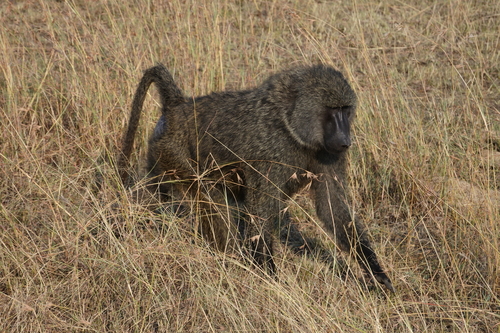
Olive Baboon
Olive baboons (Papio anubis) thrive in diverse African landscapes. With their olive fur and expressive faces, they exhibit intricate social structures. Highly adaptable, these baboons are key to seed dispersal, enriching their ecosystems and showcasing remarkable survival skills in various habitats.
25 years
Lifespan
13.61 - 24.95 kg
Weight
Length: 48 - 76 cm; Height: 61 cm
Size
Grey, Grey-Brown
Color
25 years
Age of Sexual Maturity
Least Concern
Conservation Status
Stable
Population Trend
Characteristics
The olive baboon, Papio anubis, inhabits savannas, grasslands, and forests across 25 African countries. Notable for its olive-colored coat, this social primate forms large troops with complex hierarchies. Known for its adaptability, the species plays a crucial role in seed dispersal and ecosystem dynamics.
Distribution Range of the Olive Baboon
The Olive Baboon (Papio anubis) is native to a wide geographical region across central Sub-Saharan Africa. This includes countries like Ethiopia, Kenya, Uganda, Rwanda, Tanzania, Nigeria, and parts of the Democratic Republic of the Congo. The species is distributed over various ecosystems across the eastern and central parts of the African continent.
Olive Baboon's Habitat
Environmental Conditions
Olive Baboons are highly adaptable and can be found in diverse environmental conditions. They inhabit savannas, steppes, and forests. These areas typically have a tropical climate with distinct wet and dry seasons. The vegetation in these habitats includes grasslands, shrubs, and forested areas, providing ample food and shelter.
Ecological Niche
Papio anubis occupies a versatile ecological niche, making them one of the most adaptable primate species. They are omnivorous and feed on a wide range of food, including fruits, seeds, leaves, insects, and small animals. Their adaptability allows them to thrive in various ecosystems, and they play a significant role in their environment as both predators and seed dispersers. Their social structure is complex, involving large troops that provide protection and collaborative foraging.
Copyright @ Nature Style Limited. All Rights Reserved.
 English
English